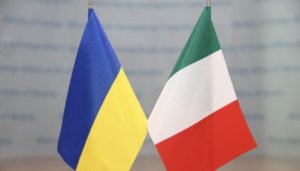
Italy will join the processes of Ukraine’s reconstruction, in particular the restoration of the energy sector, says Italian Deputy Prime Minister and Foreign Minister Antonio Tajani.
“There can’t be negotiations without Ukraine and without Europe. It is impossible to agree on an agreement without Ukraine and without Europe…. Peace must come together with strong security guarantees for Ukraine,” he said on Monday in Kiev, speaking at a plenary session of the ‘Support Ukraine’ program.
According to Tajani, peace must be stable and lasting for Ukraine, and Italy would be happy to discuss Ukraine’s future. “Rebuilding, rebuilding, trade. We want tourists to visit Ukrainian cities and Ukrainians to visit our universities and our cities. We will participate in the rebuilding process,” he emphasized.
According to the Deputy Prime Minister, Italy, in particular, will join the restoration of the energy sector.
“We are organizing an international conference on reconstruction. It will be held in Rome on July 10-11 this year. We want to organize what will be a huge success for Ukraine,” Tajani informed.

Metinvest Mining and Metallurgical Group plans to invest almost UAH 5.7 billion in 2025 to develop its Kryvyi Rih mining and processing plants and UAH 2.5 billion in production at Kametstal (Kamianske, Dnipro region), despite the difficulties of wartime.
According to Yuriy Ryzhenkov, Metinvest’s CEO, this is a record amount in recent years, and a significant portion of it will be used to maintain the efficiency of key equipment and technological processes to ensure stable production.
The group’s press release states that its plants in Mariupol and Avdiivka were damaged by enemy shelling and the cities were occupied. Metinvest has also recently suspended operations at Pokrovske Coal Group due to the changing situation on the frontline, electricity shortages and the deteriorating security situation.
The rest of the Group’s assets in Kryvyi Rih, Zaporizhzhia and Kamianske continue to operate at varying levels of utilization, taking into account security, energy, logistics and economic factors. The priority is to take care of employees, and all of the group’s enterprises in Ukraine have bomb shelters.
The CEO added that over the three years of the full-scale invasion, the group has allocated UAH 8.4 billion to help Ukraine and its citizens, including UAH 4.4 billion for the needs of the army as part of the Rinat Akhmetov Steel Front military initiative.
“From the first day of the full-scale invasion and three years later, we continue to fight for Ukraine. Despite the challenges of wartime, Metinvest has managed not only to survive but also to maintain its status as an export leader, a pillar of the state, and one of the largest donors to the Armed Forces. All of this is thanks to the contribution of every Metinvest employee in Ukraine and abroad. We are united by a common goal – to bring victory closer by all means available. And after that, to become the foundation for post-war reconstruction,” Ryzhenkov said, as quoted by the press service.
It is emphasized that paying taxes is an important contribution to supporting the economy of Ukraine and the frontline regions. As of the end of 2024, Metinvest is the largest taxpayer in the mining and metals industry.
In addition, the Group has set up production for the army, is engaged in mine clearance, has launched mine trawls and allocated resources to purchase equipment, ammunition and machinery for the frontline.
“Metinvest is a vertically integrated group of steel and mining companies. The group’s enterprises are located mainly in Donetsk, Luhansk, Zaporizhzhia and Dnipropetrovs’k regions. The main shareholders of the holding are SCM Group (71.24%) and Smart Holding (23.76%), which jointly manage it.
Metinvest Holding LLC is the management company of Metinvest Group.

The Ukrainian drogerie chain EVA (Rush LLC) plans to expand its e-commerce logistics capacities after acquiring a warehouse in Brovary from Dragon Capital, the chain’s press service reports.
According to the report, the acquisition of the facility of the subsidiary SC Omega-1 Logistic in Brovary is due to the rapid expansion of e-commerce, which means an increase in the range and number of orders in the EVA.UA online store.
“Starting from the third quarter of this year, we plan to start re-equipping the facility acquired from Dragon Capital. In 2026, we plan to move our warehouse there, which will serve the EVA retail network in the central regions of Ukraine,” Olha Shevchenko, Executive Director of Rush LLC, said in a statement.
According to her, EVA’s own distribution center in Kyiv region with a total area of 43 thousand square meters is divided into a warehouse for the retail network (22 thousand square meters) and e-commerce (21 thousand square meters). After the re-equipment of the acquired warehouse with the area of 19.1 thousand square meters, the company plans to fully dedicate its distribution center to e-commerce.
The acquisition of the asset near the existing warehouse will also allow the company to keep its team in Brovary, Shevchenko said.
As reported, the Antimonopoly Committee of Ukraine granted permission to Rush LLC to acquire SC Omega-1 Logistic in January 2024. The sale was completed in February.
Rush LLC, which manages the EVA network, was founded in 2002. At the end of 2024, the chain had about 1080 operating stores.
According to Opendatabot, the owner of Rush LLC is Cyprus-based Incetera Holdings Limited (100%), with Ruslan Shostak and Valeriy Kiptyk as the ultimate beneficiaries.
According to the results of three quarters of 2024, Rush’s revenue amounted to UAH 19.2 billion and net profit amounted to UAH 1.2 billion. In 2023, the company’s revenue increased by 33.7% to UAH 21 billion compared to 2022, while net profit increased by 26% to UAH 2.2 billion.

President of the European Commission Ursula von der Leyen says that the European Union and its member states have provided EUR 145 billion in assistance to Ukraine.
“The European Union and its member states have supported Ukraine with 145 billion euros. This is more than anyone else has helped,” von der Leyen said during the Support Ukraine plenary session in Kyiv on Monday.
According to her, the EU has helped Ukraine cover the country’s budget deficit for the entire year 2025.
“In parallel, we must immediately provide weapons and armaments. And this will be at the center of our work over the next few weeks,” the European Commission President emphasized.
She also emphasized that Europe will strengthen Ukraine “at this critical moment”.
“I can announce that a new payment of 3.5 billion euros to Ukraine will be received in March,” von der Leyen said.

President of the European Commission Ursula von der Leyen announced the integration of the energy markets of Ukraine and Moldova into the European market by the end of next year.
“The European Commission has prepared an ambitious energy security package. The goal is to guarantee a sustainable, secure and competitive energy system for Ukraine,” she said on Monday in Kyiv, speaking at the Support Ukraine plenary session.
According to von der Leyen, during this winter, Europe provided Ukraine with 1.8 GW of electricity. “But now we will fully integrate the Ukrainian and Moldovan electricity markets into our European one by the end of next year. And we will use a potential volume of 80% of all gas reserves, which will help create profitability. All this will increase the energy security of both the European Union and Ukraine,” the President of the European Commission said.